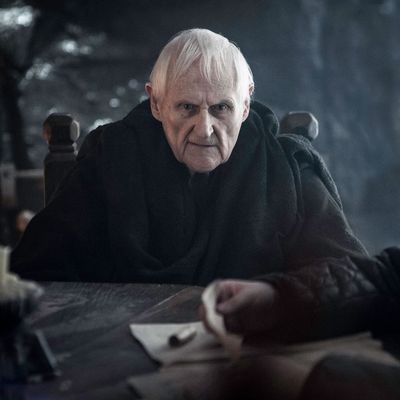
Spoilers ahead for Sunday night’s episode of Game of Thrones.
On Sunday night’s episode of Game of Thrones, Maester Aemon joined an exclusive club, becoming the rare person in Westeros to die of old age. Congratulations, Aemon — in a world full of war, famine, and pestilence, you managed to survive to age 100. Your devoted friends will light a candle in your memory, and then immediately burn your body. (At the Wall, friends don’t let friends turn into blue-eyed zombies.) But Aemon had an even more singular achievement than being one of a handful of centenarians in Westeros. As he revealed to Jon at the end of season one, Aemon was in fact the only surviving Targaryen in the Seven Kingdoms — the last remaining member of a family that once ruled the land. And, even more shocking, Aemon could have been one of those rulers himself, but instead became the first, and probably last, person in the history of Westeros to turn down the Iron Throne.
The circumstances that led him there deserve an explanation of their own. Aemon was born during what we might call Westeros’s Pax Targarya, a brief period of relative peace and prosperity that took place 200 years after Aegon the Conquerer’s invasion. The Blackfyre rebellion had been successfully squashed, Dorne had been brought peacefully into the realm, and King Daeron the Good was on the throne, with his kind and capable son, Prince Baelor, serving as Hand. Aemon was one of many grandsons of King Daeron, and as he was an unexceptional child, no one had any compunctions about sending him off to the Citadel to become a maester. After all, he was the third son of the king’s fourth son, about as likely to inherit the throne as he was to ride a dragon. Better give him something to do.
You can guess what happened next. Thanks to a series of misadventures involving Aemon’s little brother Aegon, Prince Baelor was killed in a jousting accident. King Daeron died in the Great Spring Sickness, as did Baelor’s sons. Daeron’s second son, Aerys, inherited the throne and died without children; his third son, Rhaegel, went mad. Suddenly, Aemon’s father, Maekar, was king, and after being hit in the head with a rock during a battle, he died, too. One of Aemon’s brothers had already died of a pox, while another drank wildfire in a failed attempt to become a dragon. (He burned to death, a slightly more predictable outcome.) This left Aemon the next in line, and a great council of lords called him back from his maester’s post to offer him the opportunity to become King Aemon Targaryen, the first of his name. He told them he would prefer not to, and promptly enlisted in the Night’s Watch so no one could ever use him as a pawn against his little brother, the new King Aegon V.
Why? Look at it from his perspective. The Iron Throne is an uncomfortable seat, and not just because it’s literally made of swords. You’ve got Blackfyre descendants lurking across the Narrow Sea, and half the lords in Westeros just itching to welcome them back. The Ironborn are rising in rebellion, there are droughts all the time, and oh yeah, winter still lasts ten years. It takes a special kind of person to deal with all that, and an even more special type of person to realize they are not that special person. Much better to go to the Wall, where you can grow to old age dispensing cryptically useful wisdom to those around you. As Aemon told Jon Snow a few episodes back, “Kill the boy, and let the man be born” — the same advice he gave his brother before he became king.
Might the realm have been better off with King Aemon, though? Aegon was a good king — a great one, even, considering the competition — but his upbringing left him with a deep love of the smallfolk, and, as in the real world, his efforts to provide them a greater level of social justice earned a pushback from Westeros’s ruling elites. The experience left him a bitter ruler, and he often wished for dragons to keep the recalcitrant nobles in line. (If Aemon had ever met Daenerys, she could have told him exactly how easy dragons make ruling.) No King Aegon means no Mad King, which means all of the trouble we’ve seen on Game of Thrones could have been avoided. But Aemon was a wise man, and in the end he made the wisest choice available to him at the time. If the only rules of the game of thrones are “You win or you die,” Aemon’s refusal of the throne brings to mind a famous quote from a previous HBO drama: You cannot lose if you do not play.


